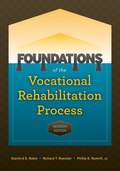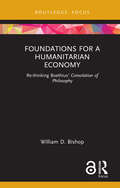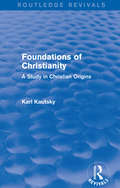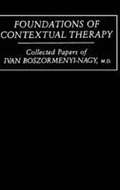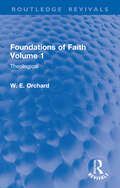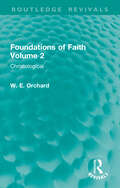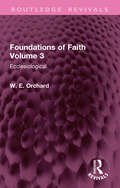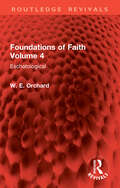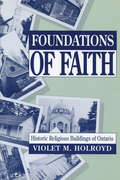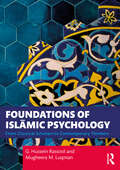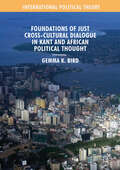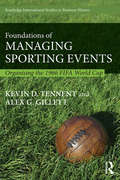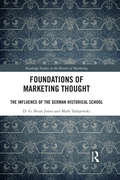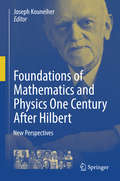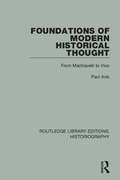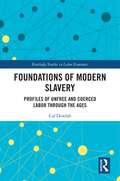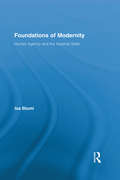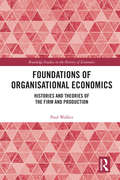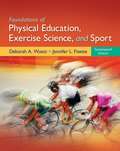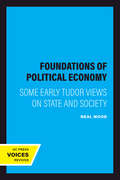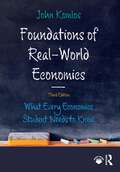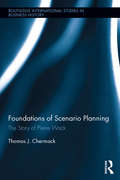- Table View
- List View
Foundations Of The Vocational Rehabilitation Process
by Richard Roessler Stanford E. Rubin Phillip D. RumrillThe seventh edition of Foundations of the Vocational Rehabilitation Process provides historical, philosophical, legislative, and sociological foundations for the habilitation/rehabilitation of persons with disabilities. A thorough and current introduction to the American vocational rehabilitation process, this edition addresses mandates presented in the current major pieces of disability legislation influencing the practice of rehabilitation.This book presents theoretical and practical assistance in translating those mandates into positive action. It is this dual process of individual and environmental proactivity that can maximize the rehabilitation of disabled individuals. Not just for the dedicated rehabilitation counselor, this book is also for students attending an introductory course at the master's- or senior-level and in-service directors who design informative training programs. New in the seventh edition:Updated chapter on how "The Americans with Disabilities Act" (ADA), as amended in 2008, prohibits discrimination on the basis of disability in employment, public services, accommodations, and telecommunications. Updated section on the right to medical treatment in light of the 2012 "Affordable Care Act" (ACA). New information and updated references were added on the five disability types--physical disabilities, emotional disorders, intellectual disabilities, learning disabilities, and visual impairments and blindness. Now includes more than 1300 references, 300 of which are new.
Foundations for a Humanitarian Economy: Re-thinking Boethius’ Consolation of Philosophy (Economics and Humanities)
by William D. BishopThe modern global economy and discipline of economics place mathematical calculation above human concern. However, a re-reading of Boethius’ The Consolation of Philosophy can positively highlight the contrast in values and spirit of the early medieval European world with our own scientific age. This book discusses the historical and cultural contexts that influenced Boethius’ writing and explores how Consolation offers a radically different understanding of economic concepts: wealth from inner happiness and virtues, poverty from hoarding outer possessions, self-sufficiency in the greater whole, enlightenment through misfortune, and development as fruition from the Good. These economic considerations resonate with a range of heterodox economic perspectives, such as Ecological and Buddhist Economics. The fundamental revaluations gained through Boethius pose a critique of mainstream neoclassical and neoliberal economics: to consumerism, avarice, growth and technology fetishism, and market rationality. These economic foundations resonate into a time when global crises raise the question of fundamental human priorities, offering alternatives to an ever-expanding industrial market economy designed for profit, and helping to avoid irrevocable socio-ecological disasters. The issues raised and questioned in this book will be of significant interest to readers with concern for pluralist approaches to economics, philosophy, classics, ancient history and theology.
Foundations for a Humanitarian Economy: Re-thinking Boethius’ Consolation of Philosophy (ISSN)
by William D. BishopThe modern global economy and discipline of economics place mathematical calculation above human concern. However, a re-reading of Boethius’ The Consolation of Philosophy can positively highlight the contrast in values and spirit of the early medieval European world with our own scientific age.This book discusses the historical and cultural contexts that influenced Boethius’ writing and explores how Consolation offers a radically different understanding of economic concepts: wealth from inner happiness and virtues, poverty from hoarding outer possessions, self-sufficiency in the greater whole, enlightenment through misfortune, and development as fruition from the Good. These economic considerations resonate with a range of heterodox economic perspectives, such as Ecological and Buddhist Economics. The fundamental revaluations gained through Boethius pose a critique of mainstream neoclassical and neoliberal economics: to consumerism, avarice, growth and technology fetishism, and market rationality. These economic foundations resonate into a time when global crises raise the question of fundamental human priorities, offering alternatives to an ever-expanding industrial market economy designed for profit, and helping to avoid irrevocable socio-ecological disasters. The issues raised and questioned in this book will be of significant interest to readers with concern for pluralist approaches to economics, philosophy, classics, ancient history and theology.
Foundations of Christianity: A Study in Christian Origins (Routledge Revivals)
by Karl KautskyFirst published in 1925, Karl Kautsky presents a Marxist history of Christianity and Christian society. Divided into four key sections, the book begins by considering the personality of Jesus as portrayed within Pagan and Christian sources and highlighting the Church’s difficulty in presenting a unified and concurrent image of Jesus and interpretation of His words. Next, Kautsky analyses the structure of Roman society, with particular emphasis on the slave-holding system, the Roman State and the historiography of the period. In the third section, an early history of the Jewish people is presented, whilst the final section discusses the beginnings of Christianity and the social struggles present within early Christian society. This is a fascinating reissue, which will be of particular interest to students of Church History, Christian theology and the various interpretations of Jesus.
Foundations of Comparative Politics
by Kenneth Newton Jan W. Van DethThis student-friendly introduction to the key theories and concepts of comparative politics now provides even broader coverage of the world's democracies, with examples drawn from across the globe. Foundations of Comparative Politics contains a wealth of information, clearly structured and easy to read, with clear definition of Key Terms. It covers all the important themes in the field, including constitutional design and institutions; mass and elite politics; policy-making and implementation; and the future of the state and democracy in a globalising world. A new chapter on studying comparative politics, and new 'What Have We Learned?' and 'Lessons of Comparison' summary sections help students pull together the lessons of each chapter. Combining facts and theory throughout, debate is stimulated through the use of Controversy boxes, and Fact Files and Briefings give students interesting data that illustrates the key issues in the text. Online resources, including MCQs and Powerpoint slides, complete the package.
Foundations of Contextual Therapy: Collected Papers of Ivan Boszormenyi-Nagy
by Ivan Boszormenyi-Nagy Helm StierlinThese collected papers, covering a period of some 30 years, allow the reader to trace the developing thought of one of the world's seminal family therapists and theoreticians. In addition to providing a wealth of clinical experience, these writings reveal a characteristic familial, cultural as well as national heritage. With roots in Hungary, experiences of Hitler's Germany and Stalin's Russia, the writings reflect the unlikely survival of a small country through extreme efforts and cultural vitality. These were the ultimate sources of Ivan Boszormanyi-Nagy's lifelong concern with the disadvantaged minority, whether a disadvantaged child in a family, a disadvantaged family in a community, or a disadvantaged nation in the world community of nations. While his thoughts and writings show a clear identity with European tradition of scholarship and philosophical inquiry, there is here too a unique and dogged effort by this pioneer to develop a coherent therapeutic perspective and system that broke new ground in the area of family therapy.
Foundations of Faith Volume 1: Theological (Routledge Revivals)
by W. E. OrchardOriginally published in 1924, this is the first of four volumes to discuss Christian Theology, under the guidance of the historic decisions of the Christian Church and the prevailing tendencies of Catholic thought in the early 20th Century. This volume deals with the fundamental groundwork of Thesim.
Foundations of Faith Volume 2: Christological (Routledge Revivals)
by W. E. OrchardOriginally published in 1925, this is the second of four volumes to discuss Christian Theology, under the guidance of the historic decisions of the Christian Church and the prevailing tendencies of Catholic thought in the early 20th Century. This volume deals with the specific beliefs connected with the person of Christ.
Foundations of Faith Volume 3: Ecclesiological (Routledge Revivals)
by W. E. OrchardOriginally published in 1926, this is the third of four volumes to discuss Christian Theology, under the guidance of the historic decisions of the Christian Church and the prevailing tendencies of Catholic thought in the early 20th Century. This volume is concerned with the Church, considering questions of authority and what is meant by ‘Catholic’.
Foundations of Faith Volume 4: Eschatological (Routledge Revivals)
by W. E. OrchardOriginally published in 1927, this is the final of four volumes to discuss Christian Theology, under the guidance of the historic decisions of the Christian Church and the prevailing tendencies of Catholic thought in the early 20th Century. This volume is concerned with subjects that can generally be summed up under the title Eschatology: that part of theology concerned with death, judgements and the final destiny of the soul.
Foundations of Faith: Historic Religious Buildings of Ontario
by Violet M. HolroydThe Ontario landscape is dotted with places of worship, from the simple log cabin to lofty cathedrals. Behind each lie personal stories of exceptional individuals and historical events, all of which have helped shape our lives.The lovers of Anne of Green Gables may be pleasantly surprised by Lucy Maud Montgomery’s long association with the Leaksdale Manse just north of Toronto. From the James Bay lowlands comes an unusual example of ingenuity involving a historic Moose Factory landmark, while the poignant love story involving Florence Nightingale and a local minister is depicted in the attractive stained glass window of a church in Elora. A more recent page of history is captured through the side-by-side relationship of a synagogue and mosque. Throughout, Foundations of Faith will delight the armchair traveller and invite the mobile history buff to explore Ontario.
Foundations of Islāmic Psychology: From Classical Scholars to Contemporary Thinkers
by G. Hussein Rassool Mugheera M. LuqmanFoundations of Islāmic Psychology: From Classical Scholars to Contemporary Thinkers examines the history of Islāmic psychology from the Islāmic Golden age through the early 21st century, giving a thorough look into Islāmic psychology’s origins, Islāmic philosophy and theology, and key developments in Islāmic psychology. In tracing psychology from its origins in early civilisations, ancient philosophy, and religions to the modern discipline of psychology, this book integrates overarching psychological principles and ideas that have shaped the global history of Islāmic psychology. It examines the legacy of psychology from an Islāmic perspective, looking at the contributions of early Islāmic classical scholars and contemporary psychologists, and to introduce how the history of Islāmic philosophy and sciences has contributed to the development of classical and modern Islāmic psychology from its founding to the present. With each chapter covering a key thinker or moment, and also covering the globalisation of psychology, the Islāmisation of knowledge, and the decolonisation of psychology, the work critically evaluates the effects of the globalisation of psychology and its lasting impact on indigenous culture. This book aims to engage and inspire students taking undergraduate and graduate courses on Islāmic psychology, to recognise the power of history in the academic studies of Islāmic psychology, to connect history to the present and the future, and to think critically. It is also ideal reading for researchers and those undertaking continuing professional development in Islāmic psychology, psychotherapy, and counselling.
Foundations of Just Cross-Cultural Dialogue in Kant and African Political Thought (International Political Theory)
by Gemma K. BirdThis book addresses the potential existence of shared foundational principles in the work of Immanuel Kant and a range of African political thought, as well as their suitability in facilitating just and fair cross-cultural dialogue. The book first establishes an analytical framework grounded in a Kantian approach to understanding shared human principles, suggesting that a drive to be self-law giving may underpin all human interactions regardless of cultural background. It then investigates this assumption by carrying out a theoretical analysis of texts and speeches from a variety of African scholarship, ranging from the colonial period to the present day. The analysis, divided into three distinctive chapters covers the Négritude movement, African socialism and post-colonial philosophers, including such thinkers as: Léopold Sédar Sengor, Julius K Nyerere, Kwame Nkrumah, Kwame Anthony Appiah, Kwasi Wiredu and Kwame Gyekye. The author argues that underpinning each of their very different theoretical positions and arguments is a foundational argument for the importance of self-law giving. In doing so she highlights the need to respect this principle when embarking on cross-cultural dialogues. The book will be of interest to students and scholars in the fields of African political thought, political theory and international relations.
Foundations of Managing Sporting Events: Organising the 1966 FIFA World Cup (Routledge International Studies in Business History #33)
by Kevin D Tennent Alex G. Gillett2016 marks the 50th anniversary of the 1966 FIFA World Cup, hosted in England. Unlike previous literature, which has tended to focus activities on the field, this book brings an institutional level approach to organizing the 1966 FIFA World Cup and examines the management process in the buildup and execution of the event. This intriguing new volume looks at the first significant UK government intervention in football and how this created a significant legacy as the government started to take a real interest in leisure facilities and stadium safety as policy areas after this competition. Foundations of Managing Sporting Events will be of considerable interest to research academics working on aspects of post war British, Imperial, and World history including sport, social, business, economic, and political history.
Foundations of Marketing Thought: The Influence of the German Historical School (Routledge Studies in the History of Marketing)
by Mark Tadajewski D.G. Brian JonesThe study and teaching of marketing as a university subject is generally understood to have originated in America during the early 20th century emerging as an applied branch of economics. This book tells a different story describing the influence of the German Historical School on institutional economists and economic historians who pioneered the study of marketing in America and Britain during the late 19th and early 20th centuries. Drawing from archival materials at the University of Wisconsin, Harvard Business School, and the University of Birmingham, this book documents the early intellectual genealogy of marketing science and traces the ideas that early American and British economists borrowed from German scholars to study and teach marketing. Early marketing scholars both in America and Britain openly credited the German School, and its ideology based on social welfare and distributive justice was a strong motivation for many institutional economists who studied marketing in America, predating the modern macro-marketing school by many decades. Challenging many traditional beliefs, this book provides an authoritative new narrative of the origins of marketing thought. It will be of great interest to educators, scholars and advanced students with an interest in marketing theory and history, and in the history of economic thought.
Foundations of Mathematics and Physics One Century After Hilbert: New Perspectives
by Joseph KouneiherThis book explores the rich and deep interplay between mathematics and physics one century after David Hilbert’s works from 1891 to 1933, published by Springer in six volumes. The most prominent scientists in various domains of these disciplines contribute to this volume providing insight to their works, and analyzing the impact of the breakthrough and the perspectives of their own contributions. The result is a broad journey through the most recent developments in mathematical physics, such as string theory, quantum gravity, noncommutative geometry, twistor theory, Gauge and Quantum fields theories, just to mention a few. The reader, accompanied on this journey by some of the fathers of these theories, explores some far reaching interfaces where mathematics and theoretical physics interact profoundly and gets a broad and deep understanding of subjects which are at the core of recent developments in mathematical physics. The journey is not confined to the present state of the art, but sheds light on future developments of the field, highlighting a list of open problems. Graduate students and researchers working in physics, mathematics and mathematical physics will find this journey extremely fascinating. All those who want to benefit from a comprehensive description of all the latest advances in mathematics and mathematical physics, will find this book very useful too.
Foundations of Modern Historical Thought: From Machiavelli to Vico (Routledge Library Editions: Historiography)
by Paul AvisThe emergence of a sense of the past in Renaissance humanism gave rise to a new historical consciousness about the meaning of history and methods of historical enquiry. This book, originally published in 1986, provides an in-depth critical introduction to the historical thought of some of the most influential thinkers of Western culture, from Machiavelli’s reflections on history and power to the revolutionary intuitions of Giambattista Vico’s New Science of historical understanding, taking in Bodin, Montaigne, Bacon, Descartes, Hobbes, Locke, Newton, Leibniz and Bayle on the way.
Foundations of Modern International Thought
by David ArmitageBetween the early seventeenth and mid-nineteenth centuries, major European political thinkers first began to look outside their national borders and envisage a world of competitive, equal sovereign states inhabiting an international sphere that ultimately encompassed the whole globe. In this insightful and wide-ranging work, David Armitage - one of the world's leading historians of political thought - traces the genesis of this international turn in intellectual history. Foundations of Modern International Thought combines important methodological essays, which consider the genealogy of globalisation and the parallel histories of empires and oceans, with fresh considerations of leading figures such as Hobbes, Locke, Burke and Bentham in the history of international thought. The culmination of more than a decade's reflection and research on these issues, this book restores the often overlooked international dimensions to intellectual history and recovers the intellectual dimensions of international history.
Foundations of Modern Slavery: Profiles of Unfree and Coerced Labor through the Ages (Routledge Studies in Labour Economics)
by Caf DowlahThis is an academic inquiry into how labor power has been dehumanized and commodified around the world through the ages for capital accumulation and industrialization, and colonial and post-colonial economic transformation. The study explores all major episodes of slaveries beginning from the ancient civilizations to the end of Transatlantic Slave Trade in the eighteenth century; the worlds of serfdoms in the context of Western Europe, Eastern Europe, and Russia; the worlds of feudalisms in the context of Latin America, Japan, China, and India; the worlds of indentured servitudes in the context of the Europeans, the Indians, and the Chinese; the worlds of guestworkers in the contexts of the United States and Western Europe; the worlds of migrant labor programs in the context of the Gulf States; and the contemporary world of neoslavery focusing on human trafficking in both developing and developed countries, and forced labor in global value chains. The book is designed not only for students and academia in labor economics, labor history, and global socio-economic and political transformations, but also for the intelligent and inquiring policy makers, reformers, and general readers across the disciplinary pursuits of Economics, Political Science, History, Sociology, Anthropology, and Law.
Foundations of Modernity: Human Agency and the Imperial State (Routledge Studies in Modern History)
by Isa BlumiInvestigating how a number of modern empires transform over the long 19th century (1789-1914) as a consequence of their struggle for ascendancy in the Eastern Mediterranean and Middle East, Foundations of Modernity: Human Agency and the Imperial State moves the study of the modern empire towards a comparative, trans-regional analysis of events along the Ottoman frontiers: Western Balkans, the Persian Gulf and Yemen. This inter-disciplinary approach of studying events at different ends of the Ottoman Empire challenges previous emphasis on Europe as the only source of change and highlights the progression of modern imperial states. The book introduces an entirely new analytical approach to the study of modern state power and the social consequences to the interaction between long-ignored "historical agents" like pirates, smugglers, refugees, and the rural poor. In this respect, the roots of the most fundamental institutions and bureaucratic practices associated with the modern state prove to be the by-products of certain kinds of productive exchange long categorized in negative terms in post-colonial and mainstream scholarship. Such a challenge to conventional methods of historical and social scientific analysis is reinforced by the novel use of the work of Louis Althusser, Talal Asad, William Connolly and Frederick Cooper, whose challenges to scholarly conventions will prove helpful in changing how we understand the origins of our modern world and thus talk about Modernity. This book offers a methodological and historiographic intervention meant to challenge conventional studies of the modern era.
Foundations of Organisational Economics: Histories and Theories of the Firm and Production (Routledge Studies in the History of Economics)
by Paul WalkerFoundations of Organisational Economics: Histories and Theories of the Firm and Production delves into a range of key topics to do with the history of the mainstream approach to the theory of production and the theory of the firm. This includes the frameworks used to analyse production, the division of labour and its application to the firm and the development of the neoclassical model of production. The first topic explored is the change from a normative approach to a largely positive approach to the analysis of the theory of production, which occurred around the seventeenth century. The next topic is an examination of the relationship (or the lack of a relationship) between the division of labour and the theory of the firm. In the fourth chapter, the focus is on the development of the proto-neoclassical approach to production. Here, the development of the theories of monopoly, oligopoly and perfect competition are discussed, as well as the theory of input utilisation. Chapter 5 looks at Marshall’s idea of the representative firm, which was the main early neoclassical approach to the theory of industry-level production. The penultimate chapter considers the criticisms made of the neoclassical model between 1940 and 1970. This work is an illuminating reference for students and researchers of the history of economic thought, industrial organisation, microeconomic theory and organisational studies.
Foundations of Physical Education, Exercise Science, and Sport 17th Edition
by Deborah A. Wuest Jennifer FisetteIntegrating the traditional presentation of the nature, scope, philosophy, and history of physical education and sport with the growing career opportunities available within this dynamic field, this text addresses the challenges and the future of the discipline. It emphasizes preparation for a diversity of careers, addressing areas such as teaching, coaching, exercise leadership, athletic and personal training, sport management, and sport media.
Foundations of Political Economy: Some Early Tudor Views on State and Society
by Neal WoodConventional wisdom claims that the seventeenth century gave birth to the material and ideological forces that culminated in the Industrial Revolution and the rise of capitalism. Not true, according to Neal Wood, who argues that much earlier reformers—Dudley, Starkey, Brinklow, Latimer, Crowley, Becon, Lever, and Thomas Smith, as well as the better-known More and Fortescue—laid the groundwork by fashioning an economic conception of the state in response to social, economic and political conditions of England. Wood's innovative study of these early Tudor thinkers, who upheld the status quo yet condemned widespread poverty and suffering, will interest historians, political scientists, and social and political theorists.
Foundations of Real-World Economics: What Every Economics Student Needs to Know
by John KomlosThe 2008 financial crisis, the rise of Trumpism, and the other populist movements which have followed in their wake have grown out of the frustrations of those hurt by the economic policies advocated by conventional economists for generations. Despite this, textbooks remain frozen in time, continuing to uphold traditional policies as though nothing has happened. Foundations of Real-World Economics demonstrates how misleading it can be to apply oversimplified models of perfect competition to the real world. The math works well on college blackboards but not so well on the Main Streets of America. This volume explores the realities of oligopolies, the real impact of the minimum wage, the double-edged sword of free trade, and other ways in which powerful institutions cause distortions in mainstream models. Bringing together the work of key scholars like Kahneman, Minsky, and Schumpeter, this textbook takes into consideration the inefficiencies that arise when the perfectly competitive model is applied to the real world dominated by multinational oligopolies. The third edition has been updated throughout, bringing in new material on the financial crises, the rise of populism, racism, inequality, climate change, and the Covid-19 pandemic. A must-have for students studying the principles of economics as well as micro- and macroeconomics, this textbook redresses the existing imbalance in economic teaching as John Komlos focuses on the paradigm of humanistic economics.
Foundations of Scenario Planning: The Story of Pierre Wack (Routledge International Studies in Business History)
by Thomas J ChermackPierre Wack was head of scenario planning at Royal Dutch / Shell Oil in London for just over ten years. He died in 1997. He was a pioneer of what we know today as scenario planning – an alternative and complement to strategic planning. Scenarios explore a variety of possible futures for examining decisions in organizational planning. Pierre was a unique man with interests in Indian and Japanese cultures and traditions. He travelled extensively and led a unique life that involved long periods of visiting gurus in India and extended sabbaticals in Japan. His experiences with Eastern thought no doubt shaped his ability to evolve the scenario method at Shell, and as a result he was able to lead a team that foresaw the oil crises of the 1970’s and 80’s. This new volume will cover the basic context of his life timeline and attach it to the development of his thinking about scenario planning over the course of his career. After his death, Wack’s materials, papers and documents were collected by Napier Collyns and have recently been made available at the University of Oxford where the Pierre Wack Memorial Library has been established. These documents contain a variety of clues and stories that reveal more about who Pierre Wack was, how he thought and will provide details about scenario planning that have never been seen or published. They also reveal a curious man and include a timeline written by his wife, Eve, which details their relationship over the course of 40 years. Written for management and business historians and researchers, this book will uncover unseen contributions by a scenario planning pioneer shaped by significant events in his personal life that helped him to see the world differently.
